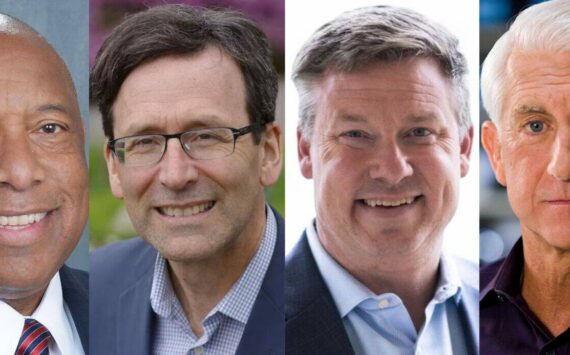Walk past 23rd and Union in the Central District and you’ll see one of the last outposts of black-owned Seattle. Surrounded by new hipster bars and cafes and two weed shops, the MidTown block houses a black-owned barbershop and liquor store and until recently was home to the Umoja Peace Center, an incubator for social-justice activism, and BlackDot, which fosters African American business and art.
In a historically black neighborhood where whites now outnumber African Americans three to one, it seemed that if MidTown were sold to big-money developers, the neighborhood would be forever lost. Things appeared all the more ominous when Omari Garrett, founder and leader of the Umoja Peace Center, was removed from the premises by King County Sheriff’s Deputies at the request of the family that owns the land, who were on the verge of closing a $20-million-plus deal on the block—a sale that would not only imperil the Peace Center but all the block’s other tenants as well. It was an ugly chapter in the neighborhood’s history that seemed to have no winners.
In the short term, at least. In a city that’s become accustomed, if not completely numb, to the realities of development, it seemed a safe bet that in the long run the winner would be whatever development firm showed up with a check for $20 million.
Which is what made last week’s news such a gulp of fresh air. Yes, we learned, a deep-pocketed developer—specifically, Lake Union Partners—had purchased the block for $23.25 million. And yes, the group planned a teardown of the block’s existing low-rises, replacing them with the kind of modern residential buildings that have become ubiquitous in Seattle. (Another safe bet: They’ll look like giant Amazon boxes with windows cut into them.)
But the announcement came with a twist. Lake Union Partners turned around and sold 20 percent of the block to Africatown, a community land trust dedicated to community land ownership in the Central District. Another land trust, Forterra, will act as an intermediary to put up the money needed to buy the 20 percent stake. Africatown and Forterra plan to develop between 120 and 135 affordable apartments priced for people making as little as $26,880 annually. The development will also include ground-floor retail. If all goes according to plan, the black community that made the Central District what it is will get an immovable stake in what it will become. As Africatown board member Kenny Pleasant said in a press release, the project “forges a shared prosperity that directly benefits the Central District and the black community.”
The MidTown project won’t be Seattle’s first community land trust. Homestead Community Land Trust has been trusting lands for a quarter-century using a model in which residents own their own houses but Homestead retains ownership of the land underneath. Residents also agree that whenever they sell the home, it will be at a predetermined price that keeps the home affordable for the next buyer. Homestead has more than 200 trusted properties inside city limits—all much cheaper than market-rate homes, and most owned by people of color.
Ownership is a crucial element of housing affordability, but public discussion of this issue is typically dominated by debates over rent control, mandatory affordable housing, and urban density—all issues that assume that the owners and users of land will be different groups of people with competing priorities. Community land trusts offer another path, one that marries the bifurcated interests of those two groups by partly melding them together. If the goal is to slow the squeeze of poor people out of Seattle, community land trusts are a proven strategy. Homestead’s work is one example locally. Across the country, land trusts have been shown to slow gentrification by keeping rents low and home ownership possible. One national study, for instance, found that land-trust homeowners were 10 times less likely to go into foreclosure than those that weren’t part of a land trust. But like any other developer, community land trusts need capital and land.
City leaders have access to plenty of the former and some of the latter, and should aggressively leverage both to increase Seattle’s stock of community land trusts. They’re a way for Seattle to densify without selling out—literally.
editorial@seattleweekly.com





